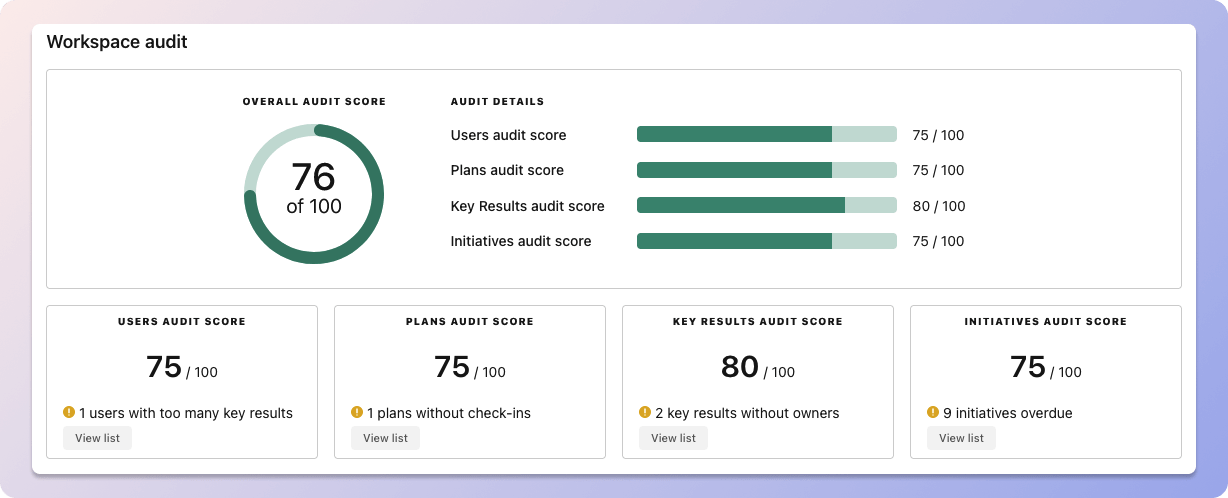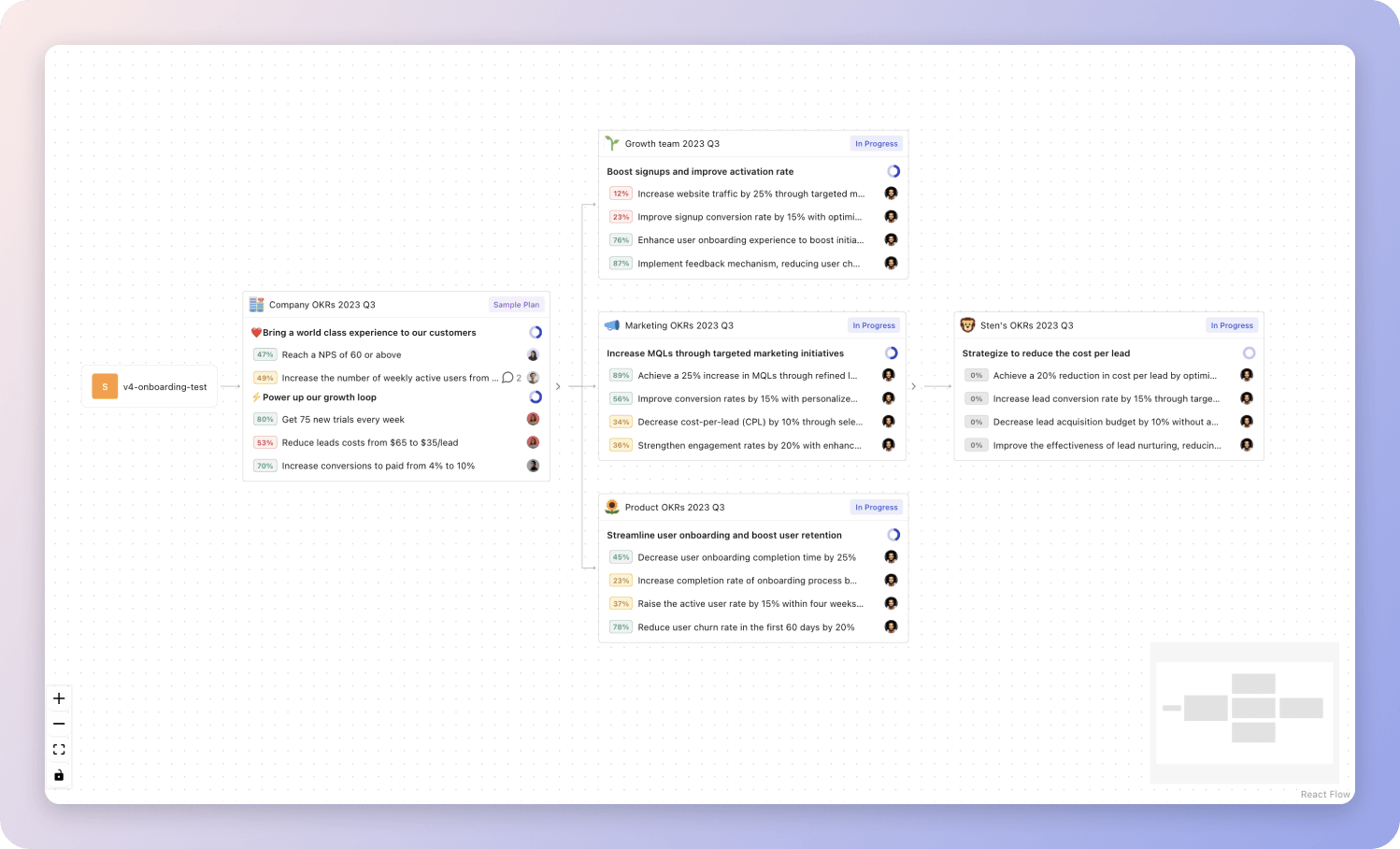15 customisable OKR examples for Human Resource Manager
What are Human Resource Manager OKRs?
The Objective and Key Results (OKR) framework is a simple goal-setting methodology that was introduced at Intel by Andy Grove in the 70s. It became popular after John Doerr introduced it to Google in the 90s, and it's now used by teams of all sizes to set and track ambitious goals at scale.
Formulating strong OKRs can be a complex endeavor, particularly for first-timers. Prioritizing outcomes over projects is crucial when developing your plans.
We've tailored a list of OKRs examples for Human Resource Manager to help you. You can look at any of the templates below to get some inspiration for your own goals.
If you want to learn more about the framework, you can read our OKR guide online.
Building your own Human Resource Manager OKRs with AI
While we have some examples available, it's likely that you'll have specific scenarios that aren't covered here. You can use our free AI generator below or our more complete goal-setting system to generate your own OKRs.
Feel free to explore our tools:
- Use our free OKR generator
- Use Tability, a complete platform to set and track OKRs and initiatives, including a GPT-4 powered goal generator
Our customisable Human Resource Manager OKRs examples
You'll find below a list of Objectives and Key Results templates for Human Resource Manager. We also included strategic projects for each template to make it easier to understand the difference between key results and projects.
Hope you'll find this helpful!
1. OKRs to develop a high-performing, cohesive team
Develop a high-performing, cohesive team
Boost team satisfaction score to above 80% through regular feedback and improvement
Implement weekly feedback sessions for open team communication
Provide training resources to improve skills
Establish a recognition system for excellent work
Increase team productivity by 20% through effective collaboration tools and training
Monitor and review team productivity post-implementation
Arrange training sessions on utilizing these tools effectively
Implement collaboration tools that streamline communication and teamwork
Achieve less than 5% turnover rate with better onboarding processes and work culture
Organize regular team-building activities
Initiate quarterly feedback and improvement sessions
Implement a comprehensive onboarding process for all new hires
2. OKRs to enhance overall organizational efficiency and effectiveness
Enhance overall organizational efficiency and effectiveness
Hike employee productivity by 20% via holistic skill development programs
Implement comprehensive skill development programs for all employees
Offer frequent training courses focused on efficiency and productivity
Encourage frequent inter-department knowledge sharing sessions
Increase internal process efficiency by 30% through streamlined workflow methods
Identify current operational bottlenecks impacting efficiency
Develop and implement streamlined workflow strategies
Monitor and adjust strategies regularly for improvement
Decrease operational costs by 15% through efficient resource utilization
Implement energy-saving measures across all company operations
Optimize supply chain management to reduce excess costs
Enhance employee productivity through targeted training
3. OKRs to improve Employee Experience
Improve Employee Experience
Implement at least 3 new employee development programs to enhance professional growth
Increase employee satisfaction score by 10 points on quarterly engagement survey
Achieve an average response time of under 24 hours for employee inquiries and concerns
Implement an automated ticketing system to prioritize and assign employee inquiries efficiently
Create standardized response templates to expedite resolution of common employee concerns
Conduct regular training sessions to enhance employee support team's response time and efficiency
Streamline internal communication channels to ensure prompt receipt and review of employee inquiries
Decrease employee turnover rate by 5% compared to previous quarter
Improve communication channels to ensure employees feel heard and valued in their roles
Implement a recognition and rewards program to boost employee motivation and retention
Conduct exit interviews to identify the main reasons behind employee turnover
Enhance employee training and development programs to improve job satisfaction
4. OKRs to devise the optimal work environment in the firm
Devise the optimal work environment in the firm
Implement staff-chosen workplace improvements in at least 3 areas
Review and prioritize the improvement suggestions given
Survey staff for improvement suggestions in different areas
Carry out prioritized improvement plans
Reduce office complaints by 50% as per HR records
Implement regular team-building activities to improve rapport
Initiate open forums for addressing grievances
Enhance employee appraisal system transparency
Increase employee satisfaction by 25% measured by internal surveys
Enhance internal communication strategies
Implement regular feedback and recognition programs
Promote work-life balance initiatives
5. OKRs to instill a high-performance culture in Finance Operations
Instill a high-performance culture in Finance Operations
Elevate employee job satisfaction rate to 90% via targeted development programs
Initiate regular feedback sessions to identify employee issues and concerns
Implement rewards and recognition system to acknowledge outstanding performance
Develop tailored training programs focusing on employee skill enhancement
Reduce financial reporting errors by 15% to ensure accuracy
Provide staff with additional training on financial reporting
Adopt automated financial reporting software to minimize manual errors
Implement a double-checking system for all financial reports
Increase department's monthly revenue by 10% through process efficiencies
Identify and eliminate unnecessary processes in the workflow
Train staff on new, streamlined procedures
Implement more efficient, cost-saving technology
6. OKRs to streamline and optimize the payroll process
Streamline and optimize the payroll process
Increase payroll team's efficiency by providing training to enhance skills
Schedule and implement chosen training programs
Source relevant training programs for these skills
Identify skill gaps within the payroll team
Reduce payroll processing time by 20%
Implement a fully automated payroll system
Outsource payroll processing to a trusted company
Train staff on efficient payroll processing practices
Implement a new payroll software to reduce errors by 15%
Regularly monitor and evaluate software performance
Research and select an efficient payroll software
Train the HR team on the new software
7. OKRs to enhance engagement and commitment via effective communication
Enhance engagement and commitment via effective communication
Introduce bi-weekly inter-departmental meetings with 95% attendance
Design an engaging and relevant meeting agenda
Draft and distribute a meeting calendar to all departments
Implement a strict, yet incentivizing attendance policy
Achieve a 20% increase in positive feedback on internal communication through anonymous surveys
Enhance the anonymity of feedback surveys
Encourage prompt and constructive feedback
Implement weekly training for improving internal communication skills
Improve internal communication by launching a company-wide newsletter reaching 100% of staff
Determine relevant content for the company-wide newsletter
Design the newsletter layout and format
Set up a distribution system reaching all staff
8. OKRs to enhance organizational performance to high-performing standards
Enhance organizational performance to high-performing standards
Implement process improvements to increase operational efficiency by 20%
Develop and execute change strategies for efficiency
Identify bottlenecks within the existing operational process
Measure and compare process effectiveness pre/post-change
Reduce employee turnover rate by 15% through effective talent engagement strategies
Implement mentorship programs to facilitate career growth
Enhance communication channels for employee feedback
Develop comprehensive benefits and recognition programs
Increase customer satisfaction levels by achieving a 10% rise in positive feedback scores
Implement regular staff training for superior customer service
Develop and promote a user-friendly feedback system
Enhance product quality and user experience
9. OKRs to streamline and optimize the payroll process
Streamline and optimize the payroll process
Implement automated payroll software by reducing manual entry by 50%
Train employees on utilization and benefits of the software
Select suitable automated payroll software for the company
Gradually transition from manual entry to automated system
Decrease processing time by 20% through improved payroll system efficiency
Identify bottlenecks in the current payroll system
Train staff on efficient payroll system practices
Implement automation for repetitive payroll tasks
Ensure 100% accuracy in payroll calculations and payments each cycle
Implement double-checking system for payroll calculations
Train staff on accurate payroll processing
Regularly update and review payroll software
10. OKRs to implement a Continuous Peer and Upwards Feedback System
Implement a Continuous Peer and Upwards Feedback System
Train 90% of team members on providing effective upward feedback in six weeks
Distribute educational materials for self-study
Schedule individual coaching sessions where needed
Arrange training sessions on effective upward feedback techniques
Design and launch a transparent peer feedback mechanism within 4 weeks
Develop an easy-to-use feedback platform
Conduct initial testing and final launch of the system
Craft a clear, understandable guideline for peer feedback
Achieve a 70% response rate in the new feedback system by the end of the quarter
Implement an attractive incentive system to engage participants
Simplify the feedback process for faster completion
Conduct regular awareness campaigns about the feedback system
11. OKRs to enhance productivity and reduce stress via effective time management
Enhance productivity and reduce stress via effective time management
Incorporate a weekly self-care routine to lower stress levels by 15%
Schedule set times each week for these activities
Evaluate stress levels each week to track improvement
Identify activities that promote relaxation and enjoyment
Implement a time tracker to record and analyze how time is spent weekly
Research and select a suitable time tracker software
Install and set up the time tracker system
Train staff on how to properly use the time tracker
Design and follow a structured daily routine, improving task completion by 20%
Prioritize tasks based on urgency and importance
Monitor progress and adjust routine as needed
Create a detailed daily schedule including all essential tasks
12. OKRs to enhance productivity across all regional offices
Enhance productivity across all regional offices
Decrease average project turnaround time by 20% through efficient resource allocation
Implement task prioritization based on urgency and project importance
Regularly monitor and optimize resource utilization
Streamline team communication to ensure faster decision-making
Increase employee engagement score by 10% via targeted training and workshops
Identify areas of low engagement via surveys or feedback forms
Organize regular workshops to boost engagement and communication
Develop targeted training programs focusing on those areas
Increase quarterly output by 15% through process optimization efforts
Regularly monitor and adjust strategies for maximum output
Implement streamlined strategies for process optimization
Conduct a comprehensive audit of current operational processes
13. OKRs to complete holistic roadmap for human capital management 2024
Complete holistic roadmap for human capital management 2024
Design 75% of HCM strategy encompassing recruitment, skills development, and retention
Outline tactics for employee retention
Develop a comprehensive recruitment plan
Design a strategy for skills development
Validate roadmap with 10+ HR experts and incorporate feedback for improvement
Identify and reach out to 10 HR experts for roadmap review
Gather and analyze feedback for potential improvements
Implement feedback into roadmap revisions
Identify all roadmap components and essential factors in the planning process
List all components required for the roadmap
Prioritize components based on their significance
Identify important elements for strategic planning
14. OKRs to improve utilization rate of employees and resources
Improve utilization rate of employees and resources
Enhance employee productivity by 20% via targeted skill training
Design and implement targeted training programs
Identify key skills required for each employee role
Evaluate individual progress after skill training
Decrease resource idle time by 10% using improved allocation strategies
Implement dynamic resource allocation software
Identify and analyze current resource utilization patterns
Foster training programs about effective resource management
Boost the resources usage efficiency by 15% through process optimization
Implement technological enhancements for improved workflow
Undertake comprehensive process audit for identifying inefficiencies
Regularly track and analyze progress towards efficiency goals
15. OKRs to boost overall employee happiness levels
Boost overall employee happiness levels
Launch a peer recognition program to uplift morale by 5%
Develop a comprehensive, engaging recognition program
Implement the program and track its results
Research effective peer recognition program strategies
Implement weekly team-building activities, improving engagement scores by 7%
Monitor engagement scores after each activity to evaluate improvement
Identify various interactive team-building activities suitable for weekly implementation
Schedule consistent weekly slots for these team-building exercises
Enhance work-life balance through flexible hours, reducing stress levels by 3%
Human Resource Manager OKR best practices to boost success
Generally speaking, your objectives should be ambitious yet achievable, and your key results should be measurable and time-bound (using the SMART framework can be helpful). It is also recommended to list strategic initiatives under your key results, as it'll help you avoid the common mistake of listing projects in your KRs.
Here are a couple of best practices extracted from our OKR implementation guide 👇
Tip #1: Limit the number of key results
Focus can only be achieve by limiting the number of competing priorities. It is crucial that you take the time to identify where you need to move the needle, and avoid adding business-as-usual activities to your OKRs.
We recommend having 3-4 objectives, and 3-4 key results per objective. A platform like Tability can run audits on your data to help you identify the plans that have too many goals.
 Tability's audit dashboard will highlight opportunities to improve OKRs
Tability's audit dashboard will highlight opportunities to improve OKRsTip #2: Commit to weekly OKR check-ins
Having good goals is only half the effort. You'll get significant more value from your OKRs if you commit to a weekly check-in process.
Being able to see trends for your key results will also keep yourself honest.
 Tability's check-ins will save you hours and increase transparency
Tability's check-ins will save you hours and increase transparencyTip #3: No more than 2 yellow statuses in a row
Yes, this is another tip for goal-tracking instead of goal-setting (but you'll get plenty of OKR examples above). But, once you have your goals defined, it will be your ability to keep the right sense of urgency that will make the difference.
As a rule of thumb, it's best to avoid having more than 2 yellow/at risk statuses in a row.
Make a call on the 3rd update. You should be either back on track, or off track. This sounds harsh but it's the best way to signal risks early enough to fix things.
How to turn your Human Resource Manager OKRs in a strategy map
Quarterly OKRs should have weekly updates to get all the benefits from the framework. Reviewing progress periodically has several advantages:
- It brings the goals back to the top of the mind
- It will highlight poorly set OKRs
- It will surface execution risks
- It improves transparency and accountability
Spreadsheets are enough to get started. Then, once you need to scale you can use a proper OKR platform to make things easier.
 Tability's Strategy Map makes it easy to see all your org's OKRs
Tability's Strategy Map makes it easy to see all your org's OKRsIf you're not yet set on a tool, you can check out the 5 best OKR tracking templates guide to find the best way to monitor progress during the quarter.
More Human Resource Manager OKR templates
We have more templates to help you draft your team goals and OKRs.
OKRs to build a robust and efficient Cloud Center of Excellence
OKRs to obtain ISO certification for our organization
OKRs to boost eCommerce sales performance
OKRs to hire top-level Senior UX Researcher
OKRs to increase automation and drive continuous improvement
OKRs to boost CRM channel revenue-streams
OKRs resources
Here are a list of resources to help you adopt the Objectives and Key Results framework.
- To learn: What is the meaning of OKRs
- Blog posts: ODT Blog
- Success metrics: KPIs examples
Create more examples in our app
You can use Tability to create OKRs with AI – and keep yourself accountable 👀
Tability is a unique goal-tracking platform built to save hours at work and help teams stay on top of their goals.
 1 Create your workspace
1 Create your workspace 2 Build plans in seconds with AI
2 Build plans in seconds with AI 3Track your progress
3Track your progress